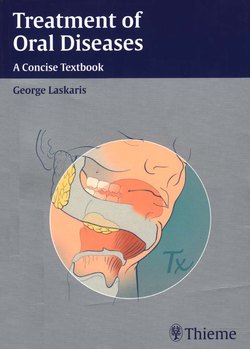Читать книгу Treatment of Oral Diseases - George Laskaris - Страница 39
На сайте Литреса книга снята с продажи.
ОглавлениеCrohn Disease
Definition
Crohn disease is a chronic granulomatous disease of the entire gastrointestinal tract.
Etiology
The exact etiology of Crohn disease is unknown. However, an immune mechanism probably participates in the pathogenesis.
Main Clinical Features
Oral manifestations occur in 10-30% of patients with Crohn disease. Occasionally the oral lesions precede the intestinal involvement.
Oral Lesions
•Granulomatous lip swelling
•Edematous, firm painless nodules with or without ulcerations
•Mucosal tags
•Multiple nodules resulting in a “cobblestone” pattern of the buccal mucosa
•Gingival swelling
•Angular cheilitis
•Erythema and scaling of perioral skin
•Aphthous-like lesions
•Pyostomatitis vegetans
•Regional lymphadenopathy
Abdominal Lesions
•Abdominal pain
•Nausea and diarrhea with or without blood
•Vomiting
•Rectal bleeding
•Low-grade fever
•Weight loss and malnutrition
Others
•Anemia
•Short stature and decreased growth
•Arthritis and spondylitis
•Uveitis
Diagnosis
The diagnosis should be confirmed by a biopsy and histopathologic examination.
Differential Diagnosis
•Cheilitis granulomatosa
•Melkersson-Rosenthal syndrome
•Sarcoidosis
•Orofacial granulomatosis
•Tuberculosis
•Foreign body reaction
Treatment
Systemic Treatment
A variety of drugs—corticosteroids, sulfasalazine and mesalamine. immunosuppressive agents, and antibiotics—and nutritional therapy are employed for the treatment of Crohn disease. The presenting form of the disease, which may be one of three broad categories, i.e., inflammatory, fistulizing, or fibrostenotic, determines the type of therapy. Active inflammatory disease, whether in the small bowel or colon, is best treated with oral 5-aminosalicylic acid (5-ASA) 3 g/day and/or antibiotics (metronidazole 1500 mg/day), If these agents are not sufficient to induce remission, corticosteroid treatment (e.g., prednisone 40-60 mg) is warranted to arrest the inflammation rapidly; it is then gradually tapered. Many patients need the minimum dose of 7.5-10 mg corticosteroid to keep the disease in remission. Infliximab is very effective in controlling the symptoms of acute and chronic active disease when other treatments fail. In severe fistulizing disease, metronidazole, ciprofloxacin, and azathioprine have been successfully used. Infliximab (chimeric antibody against TNF) has proved to be highly effective in treating fistulas and is the treatment of choice when other treatments fail. Obstruction simply because of fibrostenotic Crohn disease usually resolves spontaneously in 1-2 days with simple conservative and supportive management (i.v. fluids, nil by mouth, i.v. steroids). Probiotics, human anti-TNF, thalidomide, mycophenolate mofetil, tacrolimus, and interleukin 10/11 are promising treatment alternatives under research.
